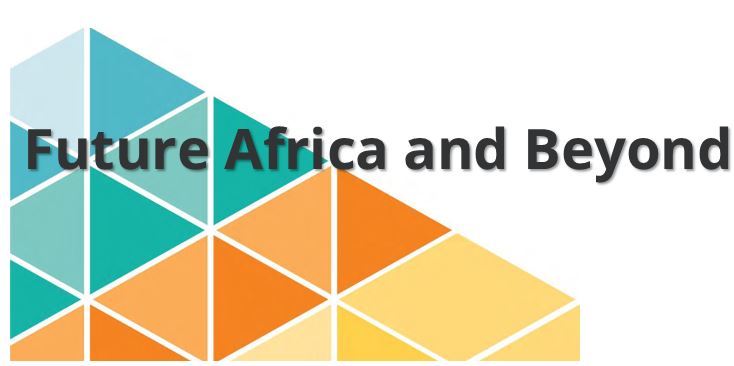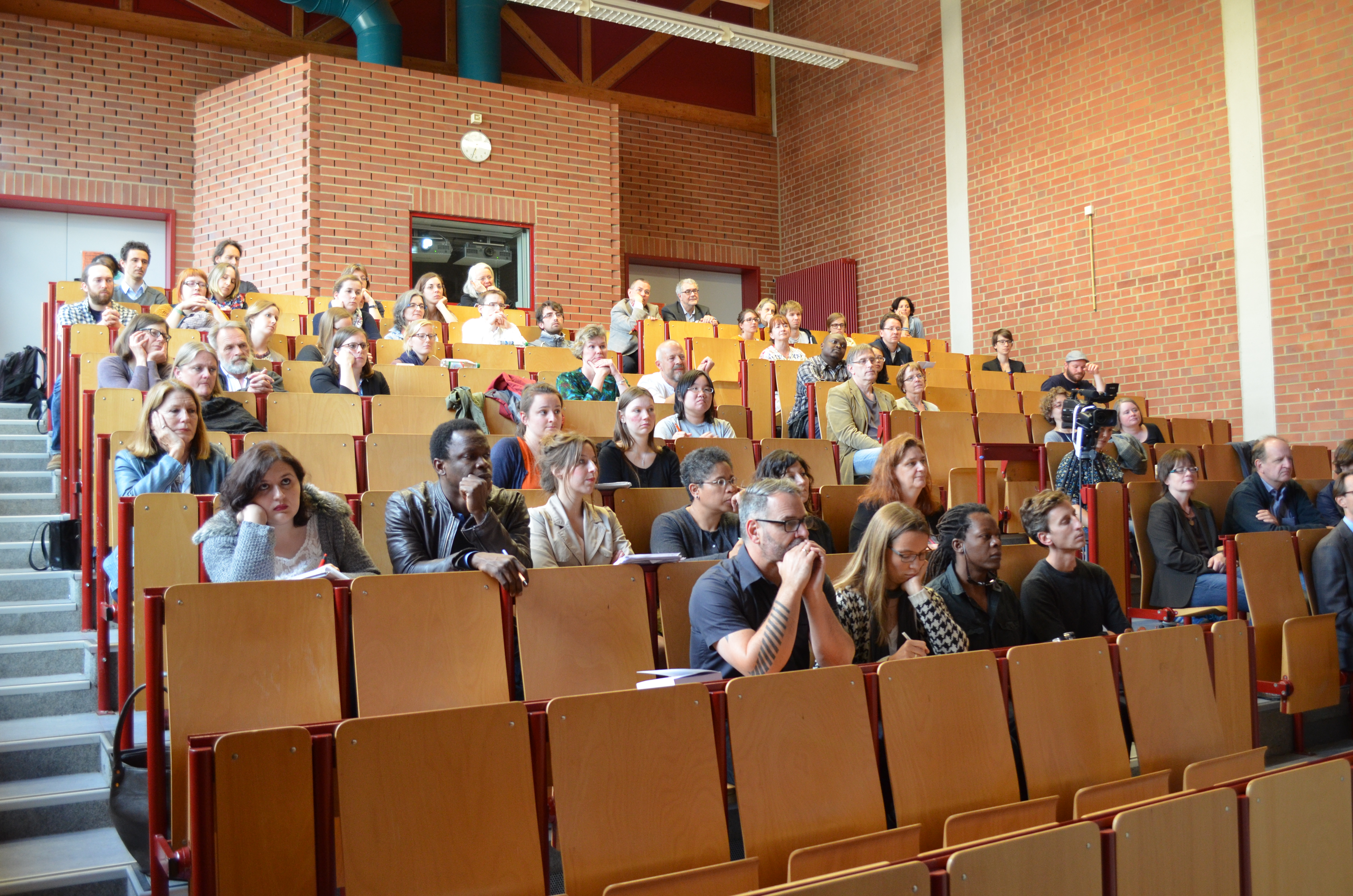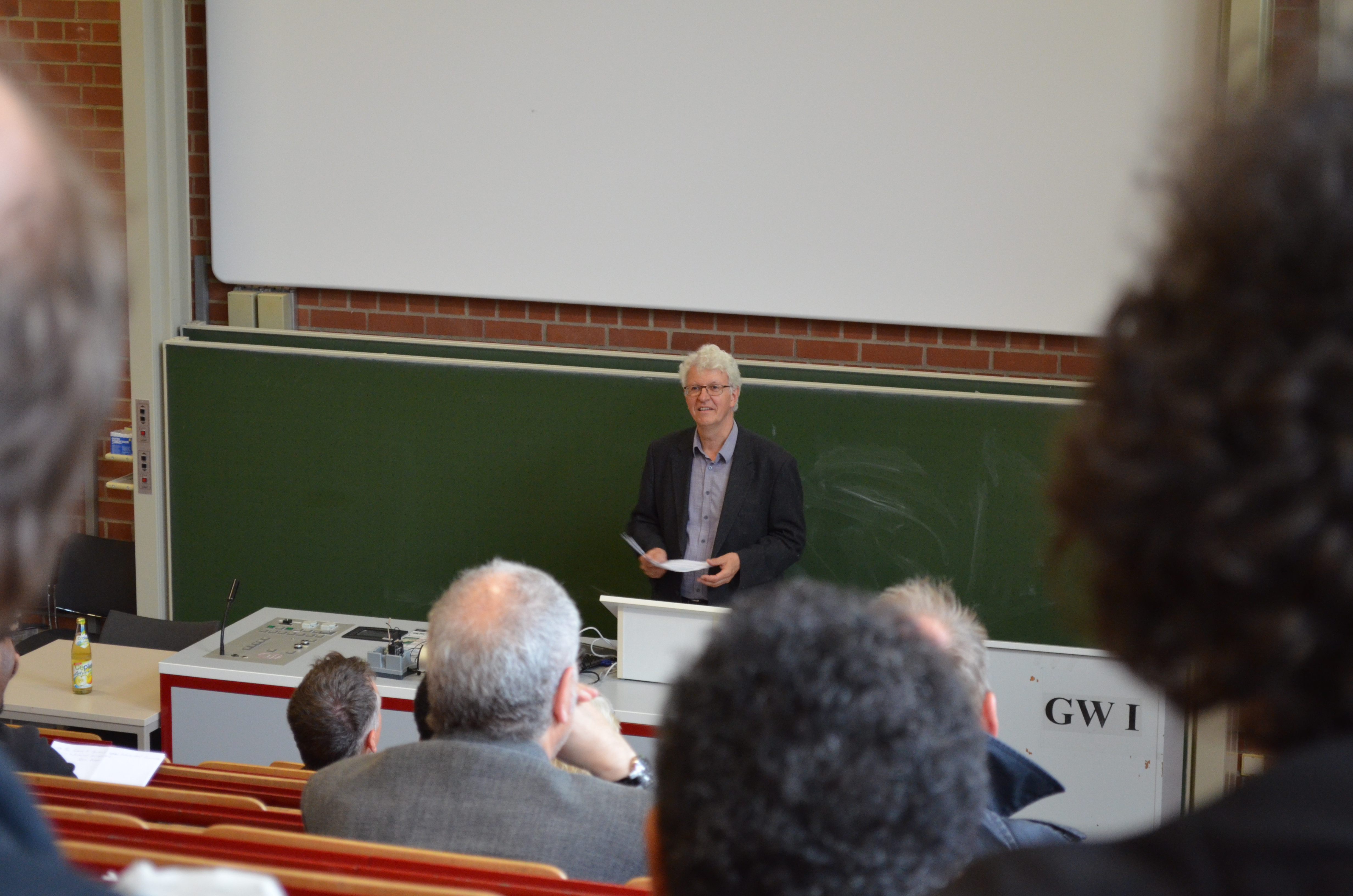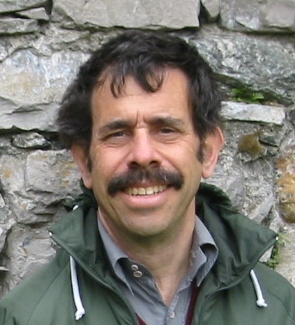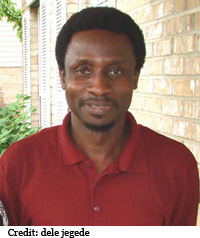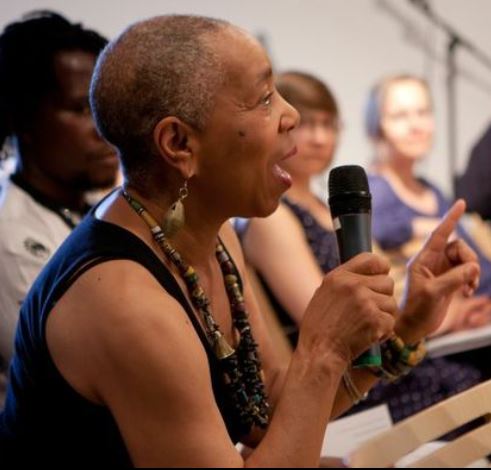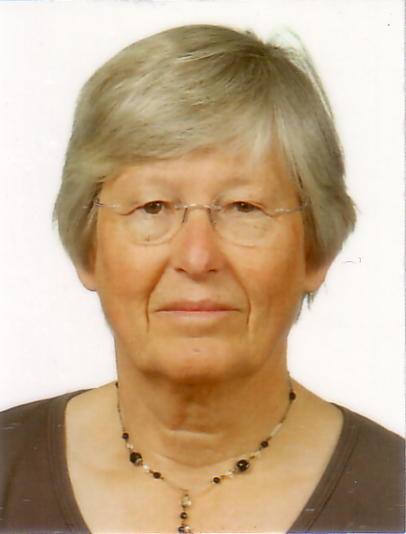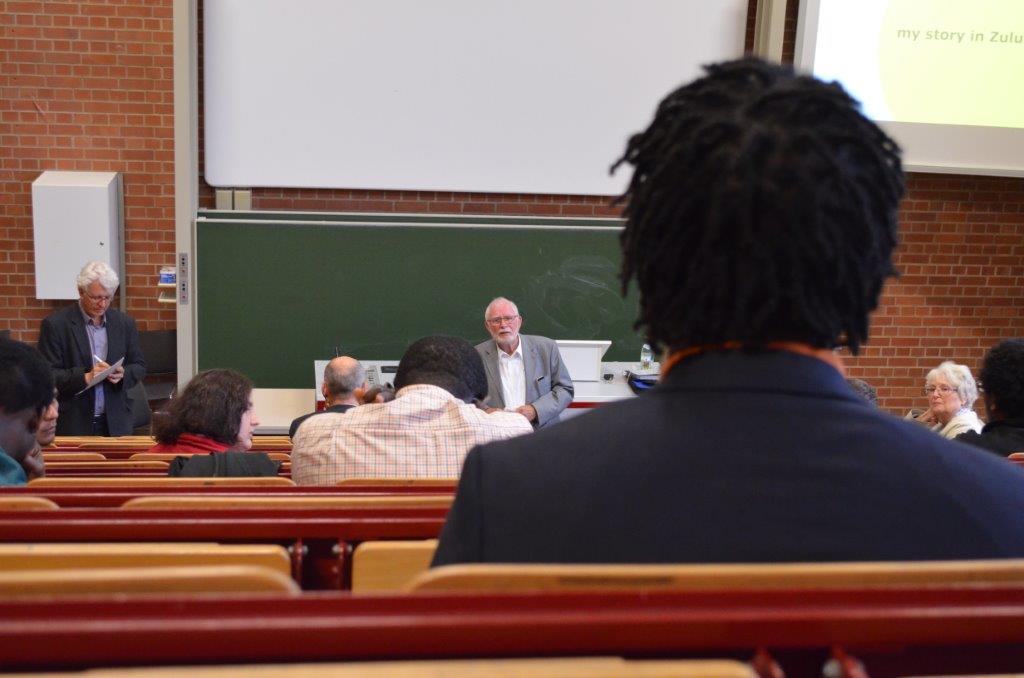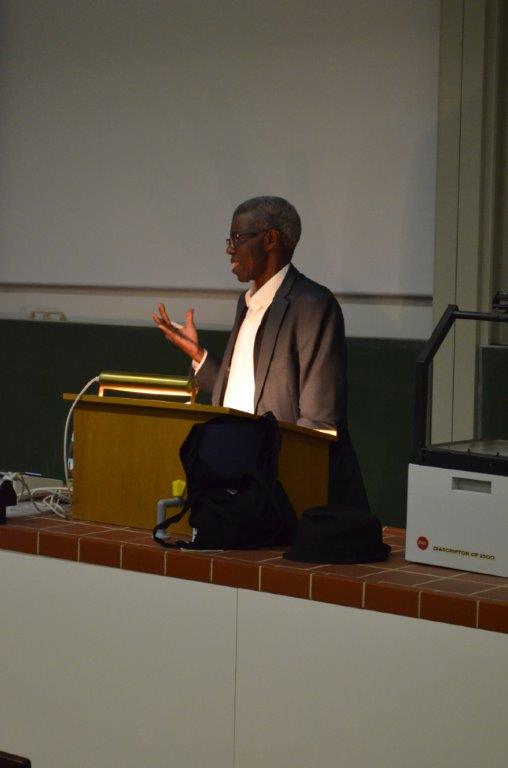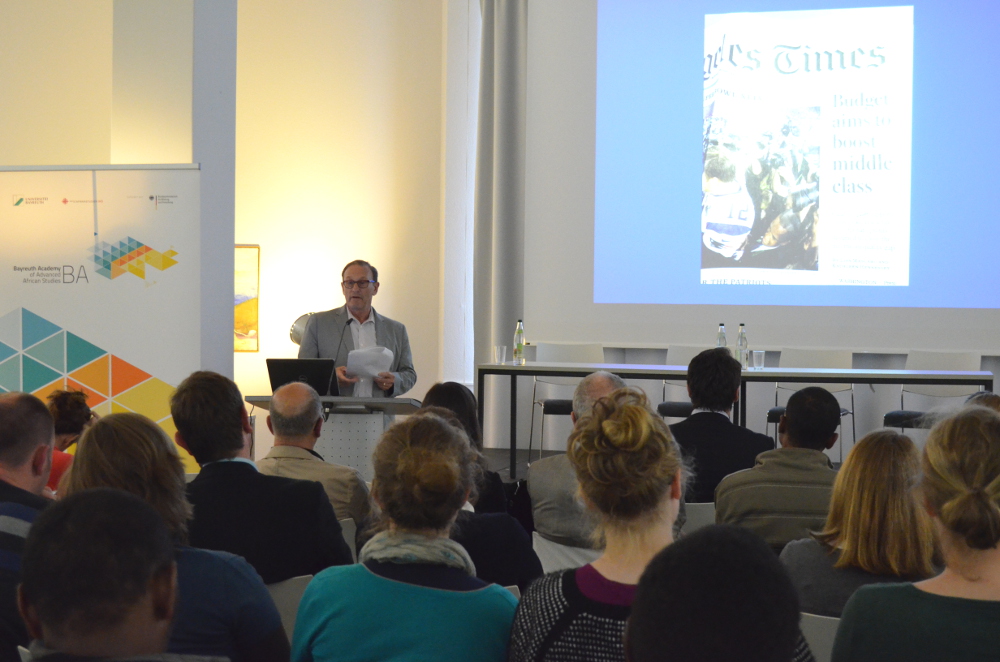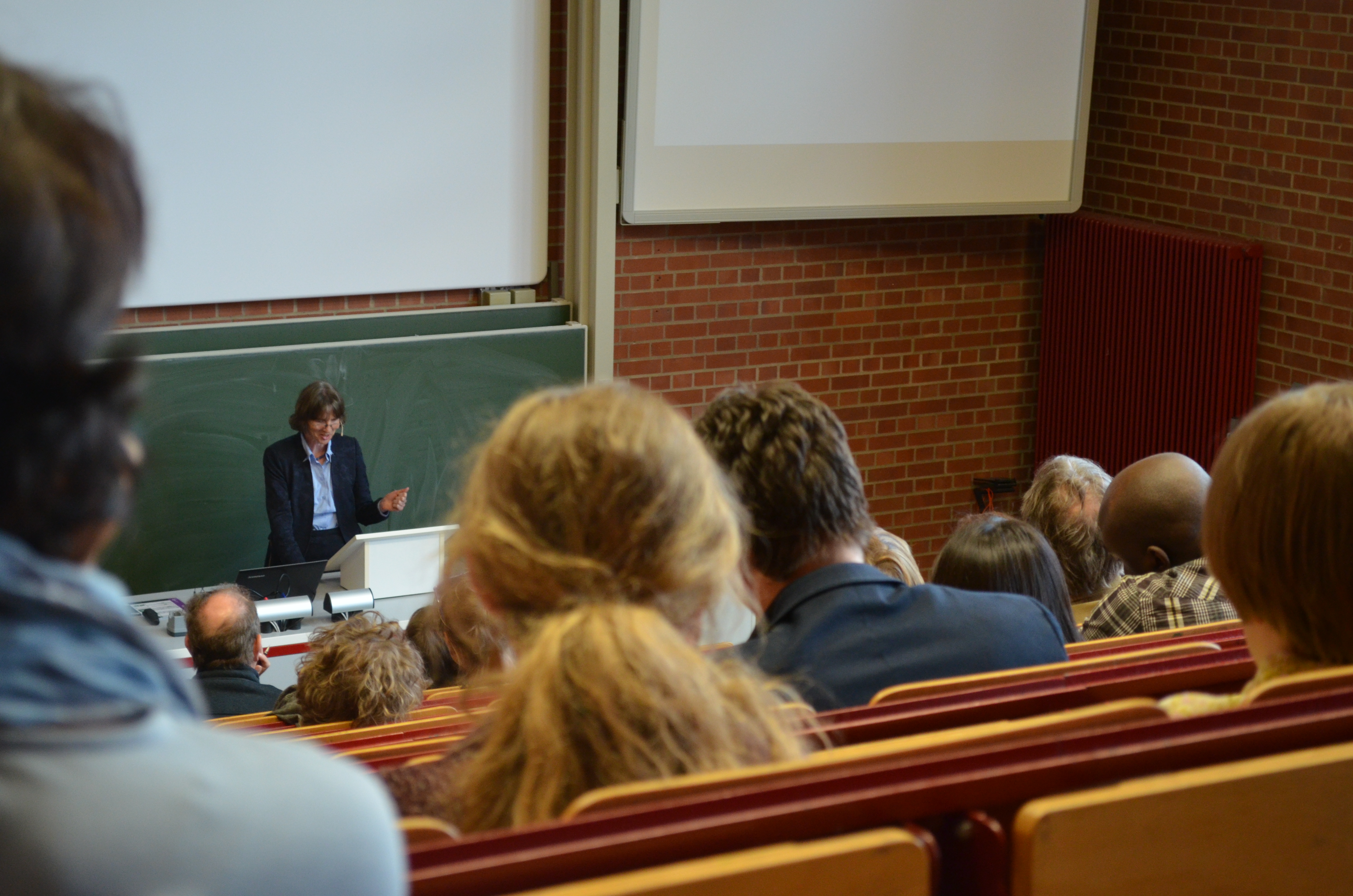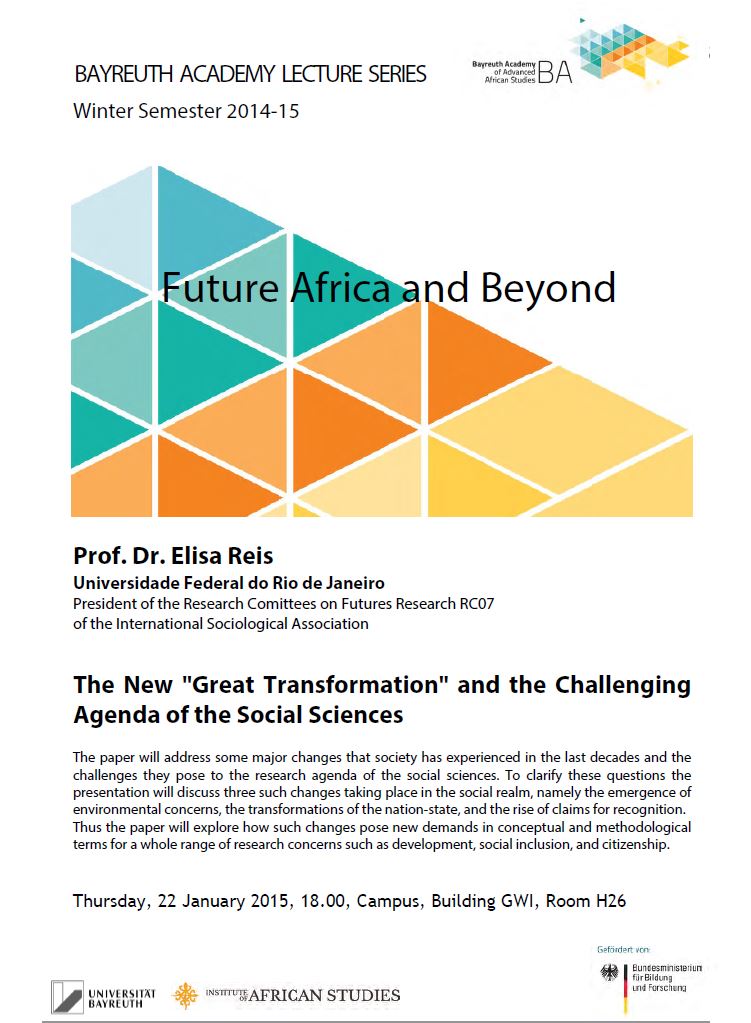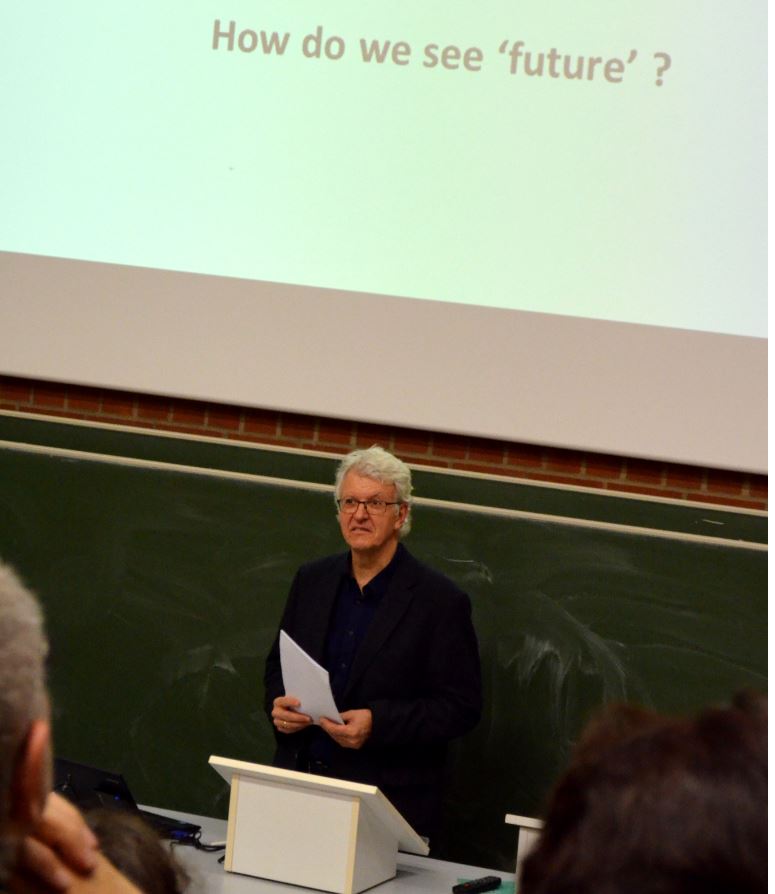“Future Africa and Beyond” Lecture Series |
|
|
The series aims at opening up basic conceptual debates about the Academy’s current research topic for a wider academic audience in the University. From their different angles, the lectures ask what research about visions of “Futures” is all about, and which more general insights can be learned from studying them in Africa and the African Diasporas. |
|
|
|
|
Past Public Lectures:
|
|
Frederick Cooper (New York University): Fri, 15.1.2016 |
|
The nation whose independence could be commemorated was not necessarily the nation African leaders had, until the very last moment before independence, sought to create. In French West Africa in the years after World War II, most leaders sought alternatives to both the colonial empire as they knew it and the territorial nation-state. As late as the summer of 1960, political leaders and political parties were still debating what kind of state should follow the end of colonial rule–Senegalese or Ivorian, or else African, or perhaps Franco-African. Among African elites, a great controversies raged in the late 1950 between those who favored an African federation within a Franco-African confederation versus those who wanted individual African territories to join a Franco-African federation in which all units would be considered equal. Only with the breakup of the Mali Federation in August 1960 was the door closed on the alternative possibilities for a political form that would have maintained a close relationship of francophone African territories with each other, and as equals with metropolitan France. The presentation emphasizes the profound uncertainty over the nature of political affinity until the moment of independence. |
|
|
|
Jihan El-Tahri (Paris): Tue, 12.1.2016 |
|
Content of the Lecture is her latest film project: "The trilogy, Egypt’s Modern Pharaohs" |
|
|
|
Paul E. Lovejoy (York University): Wed, 16.12.2015 |
|
The Muslim governments that emerged in large parts of West Africa in the eighteenth and nineteenth centuries were associated with the tradition of Jihad. Although Islam had been long established in West Africa, in some places as early as the eleventh century, and widely disseminated during the period of Songhay imperial rule in the sixteenth century, Jihad transformed much of the savanna and sahel in the eighteenth century and especially in the first third of the nineteenth century through the establishment of Muslim governments in avowedly militant confrontations that were portrayed as Jihad. The movement that was associated with Jihad during this period is poorly understood, although in the 1960s Jihad was described by a prominent historian of West Africa as a "neglected theme" and then subsequently was compared by another prominent scholar as comparable in its impact in terms of geographical scope and economic and social impact to the French Revolution in Europe at the same time. Despite this importance, the significance of Jihad and the corresponding of an era of "second slavery" comparable to the "second slavery" of the Americas has been largely ignored or overlooked in the broader field of historical scholarship and is virtually unrecognized in the study of the Atlantic world or the age of revolutions associated with Europe and the Americas. Only recently, the unavoidable consequences of contemporary Jihad have made it obvious that the silencing of the past with respect to Jihad in the eighteenth and nineteenth century has considerable intellectual and political meaning. |
|
|
|
Akin Adesokan (Indiana University): Thu, 10.12.2015 |
|
In the series of lectures, interviews and statements during his work with scholars and political activists in Canada, the Trinidadian writer C. L. R. James repeatedly uses the injunction, “You don’t play with revolution!” Three African films—Lumumba by Raoul Peck, Nha Fala by Flora Gomes, and Teza by Haile Gerima—represent moments of African revolution in complementary ways. The films’ critical focus on revolutionary degeneration represents an example of politicians “playing with,” that is “toying with,” the collective destiny of the population which invested its faith in the utopian call-to-arms. However, by deploying a variety of rhetorical strategies—ironic identification in Nha Fala; historicized narrative devices in Teza; political iconography in Lumumba—the filmmakers also relate to these historical events with a playfulness that separates the realm of artistic representation from the realm of power, even if, in the case of Cabral and Lumumba, the symbol of power appears to enjoy the filmmaker’s affection. In this lecture, I discuss these films (and others less directly invested in conventional ideas of revolution) in terms of the ties between the idea of the imagined future and the image, still or moving, playful or earnest. Through a complementary discussion of progressive African political movements in the postwar years, I focus on the materialization of the image in the uneven process of the distribution of the senses between the revolutionary leader and the audience and the temporal disconnection between the pronouncement of a watchword and its actual perception as a graphic image. The politics of the image as a signifier of utopia resides in this complex play of difference, in political intensities, class orientations, and ordinary, inescapable movement of time, all of which have to be grasped in the sensory form of perception. Finally I suggest that the fact of motion in the cinematic image provides a basis for thinking of utopia as a mutable phenomenon, in excess of the spectacle of the original “revolutionary” moments. |
|
|
|
Prof. Anne Adams (Cornell University): 25.6.2015 |
|
In this lecture, the mechanisms of transnational subjectivity, particularly as influenced by gender, are mediated through artistic contemplation in three novels: Teju Cole’s Open City, Fatou Diome’s The Belly of the Atlantic, and Segun Afolabi’s Goodbye Lucille. Do these transnational subjects represent different configurations of diaspora, or cosmopolitanism, or “migritude”? For some, the metaphor of migrating birds captures the cosmopolitan movement; for others, the waves of the (Black) Atlantic bear them between Africa’s shores and Europe’s metropolises. From these texts, what will “home” and “belonging” come to mean in the artistic sensibilities of such emigrant Africans? |
|
|
|
Prof. Keebet von Benda-Beckmann (Max Planck Institute for Social Anthropology, Halle): 18.6.2015 |
|
This lecture will argue that time dimensions embodied within legal concepts are an important and as yet underdeveloped theme in the studies of time and law. It will discuss the tensions resulting from key property concepts embodied in the component sets of law in complex legal orders. The lecture will argue that the differences in time dimensions in these property concepts are a crucial indicator for the persistent resistance against adopting a concept of property that abstracts from time as is propagated by the Indonesian state, the World Bank, and international development agencies. |
|
|
|
Jörn Rüsen (Institute for Advanced Study in the Humanities, Essen):The Future of Humanity – Intercultural Communication in a Historical Perspective 10.6.2105 |
|
The paper presents an outline of a new humanism in an intercultural perspective. The encounter of different cultural traditions and life forms in our age of globalization demands a cross-culturally valid set of norms and strategies of orientation. These norms and strategy should be made plausible by referring to the cultural nature of humankind and by developing a new philosophy of history. |
|
|
|
Souleymane Bachir Diagne (Columbia University):"On Prospective: Development and a Political Culture of Time" Souleymane Bachir Diagne received his academic training in France. An alumnus of the École Normale Supérieure, he holds an agrégation in Philosophy (1978) and he took his Doctorat d’État in philosophy at the Sorbonne (1988) where he also took his BA (1977). Before joining Columbia University in 2008 he taught philosophy for many years at Cheikh Anta Diop University, Dakar (Senegal) and at Northwestern University. His field of research includes history of logic, history of philosophy, Islamic philosophy, African philosophy and literature. 2.6.2105 |
Opening Lecture of the Bayreuth Academy Lecture Series "Future Africa and Beyond" by Prof. Aleida Assmann (University Konstanz) |
|
Prof. Aleida Assmann (University Konstanz):"Shapes of Time and Transformations of the Modern Time Regime" Thursday, 7 May 2015 |
|
|
Abstract: Humans do not live only in one single time. According to Virginia Woolf „there are seventy-six different times all ticking in the mind at once.“ But there are not only times of the mind, there are also times of the body, times of nature and times of culture. There is external and mechanical time and there is an embodied and lived time. My lecture will offer an overview of these different forms and layers of temporal experience and will then focus on a specific cultural form, which I call ‘the modern time regime’. This cultural format of shaping experience and expectation dominated Western societes after 1945 and collapsed together with the fall of the wall. We will look at its characteristics and ask why it broke down and what came after it. |
|
Lecture by Prof. Dr. Elisa Reis as part of the Bayreuth Academy Lecture Series "Future Africa and Beyond" |
|
|
Find the poster for this event here |
Prof. Elisa Reis (Universidade Federal do Rio de JaneiroPresident of the Research Comittees on Futures Research RC07 of the International Sociological Association)The New “Great Transformation” Thursday, 22 January 2015 |
|
Abstract: The paper addressed some major changes that society has experienced in the last decades and the challenges they pose to the research agenda of the social sciences. To clarify these questions the presentation discussed three such changes taking place in the social realm, namely the emergence of environmental concerns, the transformations of the nation-state, and the rise of claims for recognition. Thus the paper explored how such changes pose new demands in conceptual and methodological terms for a whole range of research concerns such as development, social inclusion, and citizenship. |
|
Opening of the Bayreuth Academy Lecture Series "Future Africa and Beyond" in the winter semster 2014 |
|
|
|
Prof. Dr. Achim von Oppen (Bayreuth)Histories of Future Africa. An interested Synopsis of Current Researches at the Bayreuth Academy Thursday, 4 December 2014 18.00 pm Campus, GWI, H26 |




